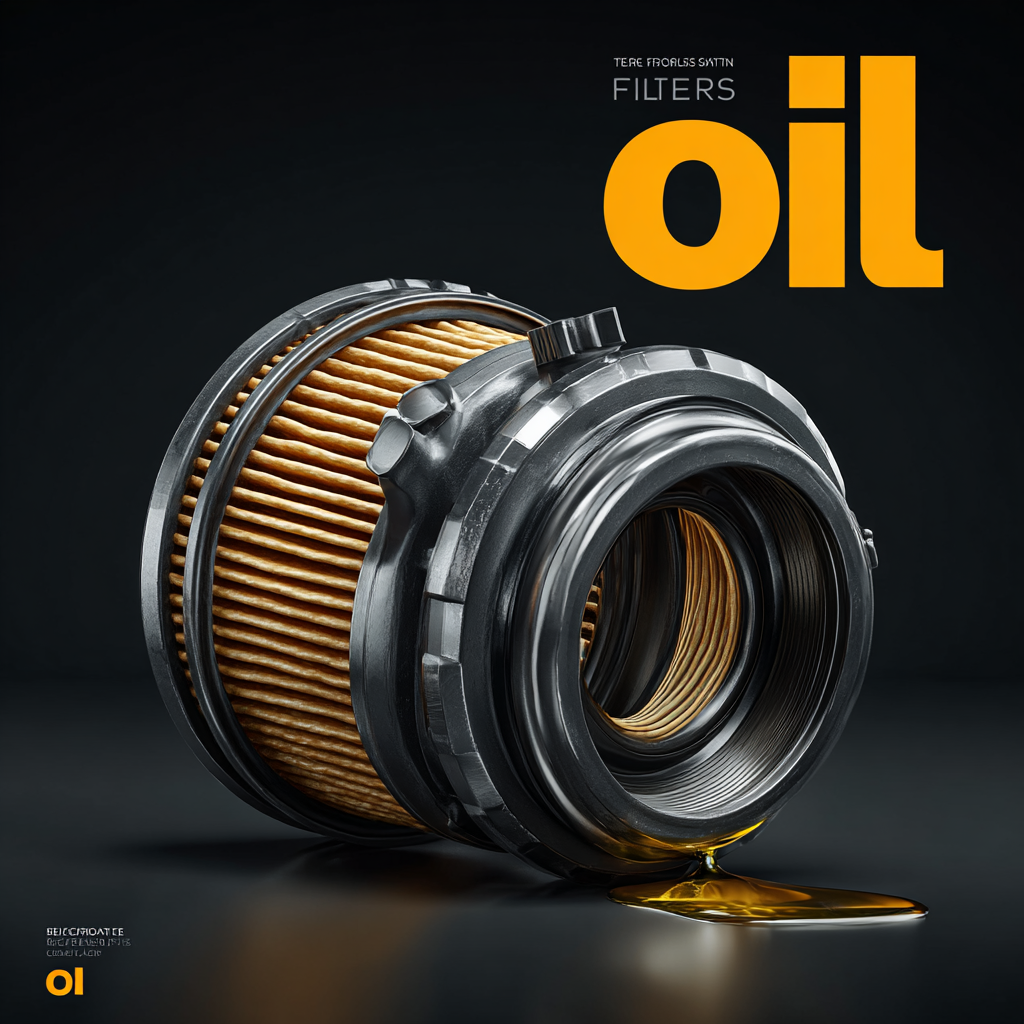
Unlocking the Secrets of the Best Oil Filters Technical Specifications and Usage Guide
In the automotive industry, the importance of high-quality Oil Filters cannot be overstated. As vehicles become more advanced, the role of oil filtration in maintaining engine performance and longevity has gained significant attention. According to recent industry reports, approximately 75% of engine wear is attributed to contaminants in the oil, making the selection of a reliable oil filter crucial. With global automotive oil filter market expected to reach USD 5.02 billion by 2026, driven by the increasing demand for efficient filtration systems, it is essential to understand the technical specifications and performance metrics of various products. This blog will delve into the intricacies of oil filters, exploring the key features that distinguish top-tier options and offering a comprehensive usage guide to help vehicle owners make informed decisions for optimal engine health.

Understanding Oil Filter Types: Selecting the Best Fit for Your Vehicle
When it comes to maintaining your vehicle’s engine performance, selecting the right oil filter is crucial. Various oil filter types are designed to serve different engines and performance needs. The two primary categories are full-flow filters and bypass filters.
Full-flow filters are predominant in most vehicles, filtering all the oil before it circulates through the engine. In contrast, bypass filters are used in specific applications where the oil needs to be filtered in a separate loop, allowing some unfiltered oil to bypass the filter.
According to a report by the Automotive Aftermarket Suppliers Association (AASA), the effectiveness of oil filters can directly impact engine longevity and efficiency. For example, high-quality filters can capture particles as small as 10 microns, which is essential for preventing engine wear.
Furthermore, an industry study indicated that vehicles using premium synthetic oil combined with high-efficiency filters experienced up to 60% better performance compared to those with standard filters.
Selecting the right type is not only about compatibility but also about leveraging better filtration technology to ensure optimum engine health and performance.
Key Technical Specifications: What to Look for in Oil Filters
 When selecting the best oil filters for your vehicle, understanding the key technical specifications is crucial for ensuring optimal engine performance. Look for filters that effectively eliminate contaminants and are designed to meet the specific requirements of your engine. High-quality oil filters should have a high dirt-holding capacity, efficient filtration efficiency, and robust construction to withstand pressure and temperature changes.
When selecting the best oil filters for your vehicle, understanding the key technical specifications is crucial for ensuring optimal engine performance. Look for filters that effectively eliminate contaminants and are designed to meet the specific requirements of your engine. High-quality oil filters should have a high dirt-holding capacity, efficient filtration efficiency, and robust construction to withstand pressure and temperature changes.
Tips: Always check the filtration media used in the oil filter; synthetic or pleated paper media often offers better performance compared to standard options. Additionally, pay attention to the filter's burst strength, which indicates how well it can handle high-pressure situations without failing.
Another important consideration is the oil filter's compatibility with your vehicle. Ensure that it meets or exceeds manufacturer specifications, as using a mismatched filter can lead to engine issues over time. Regularly monitoring your engine’s health through oil analysis can help determine the right intervals for filter changes and ensure you maintain peak performance.
The Impact of Oil Filter Efficiency on Engine Performance
 The efficiency of oil filters significantly impacts engine performance and longevity. A high-quality oil filter effectively removes contaminants such as metallic particles, soot, and dirt, which, if left unchecked, can lead to increased engine wear and reduced efficiency. According to recent reports, nearly 80% of engine wear is attributed to these harmful particles, emphasizing the critical role that oil filters play in maintaining optimal engine health. Proper filtration ensures cleaner oil circulation, enhancing lubrication and reducing the likelihood of engine failure.
The efficiency of oil filters significantly impacts engine performance and longevity. A high-quality oil filter effectively removes contaminants such as metallic particles, soot, and dirt, which, if left unchecked, can lead to increased engine wear and reduced efficiency. According to recent reports, nearly 80% of engine wear is attributed to these harmful particles, emphasizing the critical role that oil filters play in maintaining optimal engine health. Proper filtration ensures cleaner oil circulation, enhancing lubrication and reducing the likelihood of engine failure.
Tip: When selecting an oil filter, look for specifications that indicate high filtration capacity and dirt-holding efficiency. These parameters will ensure that your filter can handle the demands of modern engines, especially those using alternative fuels like biodiesel blends.
Another crucial factor to consider is the compatibility of the oil filter with the fuel type used in the engine. For engines running on biodiesel blends, for instance, selecting filters specifically designed to handle certain contaminants present in biodiesel can significantly improve performance. Utilizing advanced filter technology can lead to better engine output and reduced emissions, aligning with today’s sustainability goals in automotive engineering.
Tip: Always consult your vehicle's manual to identify the appropriate oil filter specifications needed for your engine type and fuel. This will not only enhance performance but also contribute to the long-term sustainability of your engine.
Market Trends in Oil Filters: Insights for 2025 and Beyond
As we look towards 2025 and beyond, the market for oil filters is expected to experience significant growth, driven by the rising demand for automotive filtration solutions. According to a recent report by Research and Markets, the global oil filter market is projected to reach $5.3 billion by 2028, growing at a CAGR of approximately 5.2%. This growth is largely attributed to increasing vehicle production, heightened automotive standards, and growing awareness of vehicle maintenance among consumers.
To stay ahead in this evolving landscape, it’s crucial to understand the technical specifications of oil filters. For example, measures like filtration efficiency and capacity can greatly impact vehicle performance and longevity. Choosing the right oil filter can increase engine efficiency by reducing wear and tear and maintaining optimal oil flow.
Tip:
Always consult the manufacturer's specifications when selecting an oil filter to ensure compatibility with your vehicle's engine.
In terms of materials, there is a trend towards synthetic filter media, which offers better filtration efficiency and a longer service life compared to traditional cellulose filters. Industry analysts suggest that by 2025, around 35% of the oil filter market will be dominated by synthetic media filters due to their superior performance.
Tip:
Regularly check for advancements in filter technology to make informed decisions for your vehicle's maintenance needs.
Real-World Examples: Comparing Top Oil Filter Brands and Their Features
When it comes to choosing the best oil filter, understanding the nuances of various brands and their features can significantly improve vehicle performance. Leading industry reports show that high-quality oil filters can remove up to 99% of harmful contaminants, which is crucial for maintaining engine health. For instance, Fram Xtended Guard filters are known for their advanced filtration technology, allowing them to capture particles as small as 20 microns. This level of filtration not only extends oil life but also enhances engine efficiency.
Comparatively, Mobil 1’s M1C-453 lasts up to 20,000 miles, making it an excellent choice for long-haul drivers. Its synthetic media provides high dirt-holding capacity while maintaining low pressure drop. According to research by the Automotive Oil Change Association, vehicles using these top-tier filters experience fewer engine problems and improved fuel economy, highlighting the importance of making informed choices. With such compelling data at hand, understanding the technical specifications of each filter becomes essential for any car owner aiming to optimize their vehicle’s performance.
